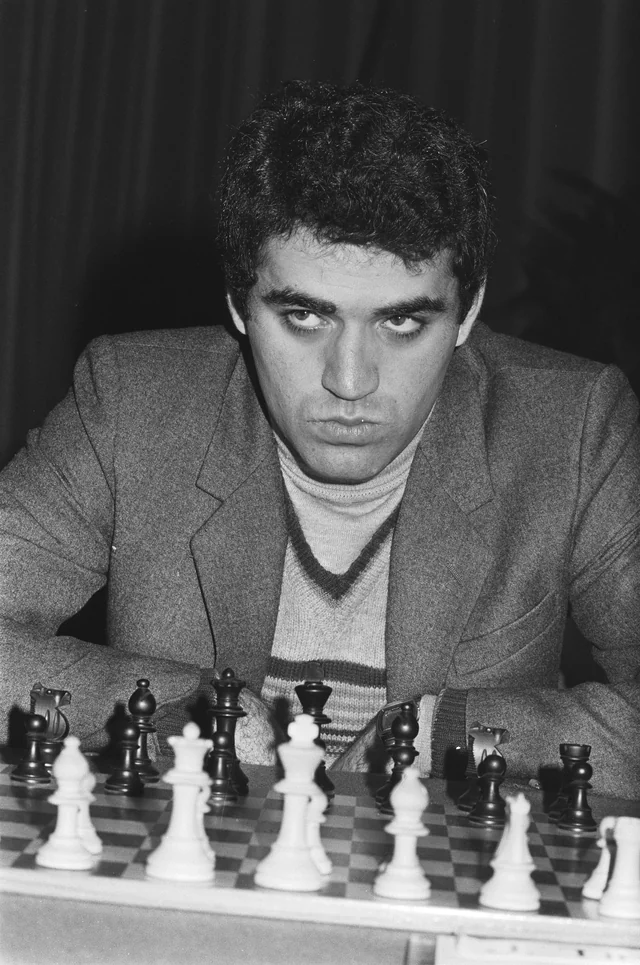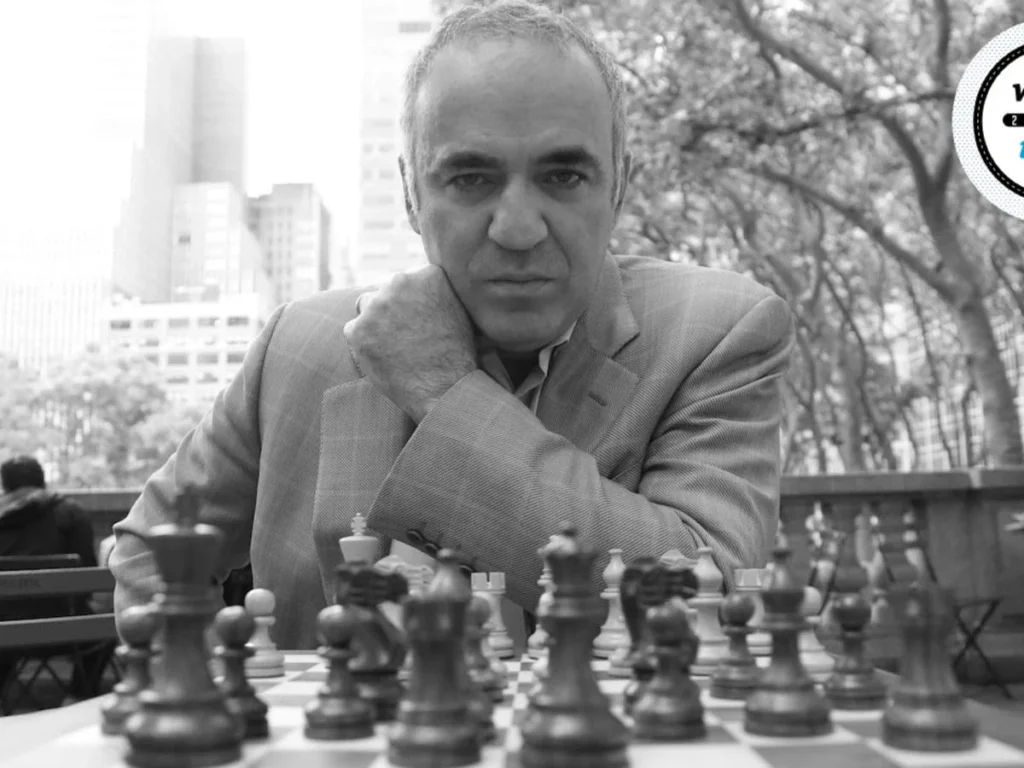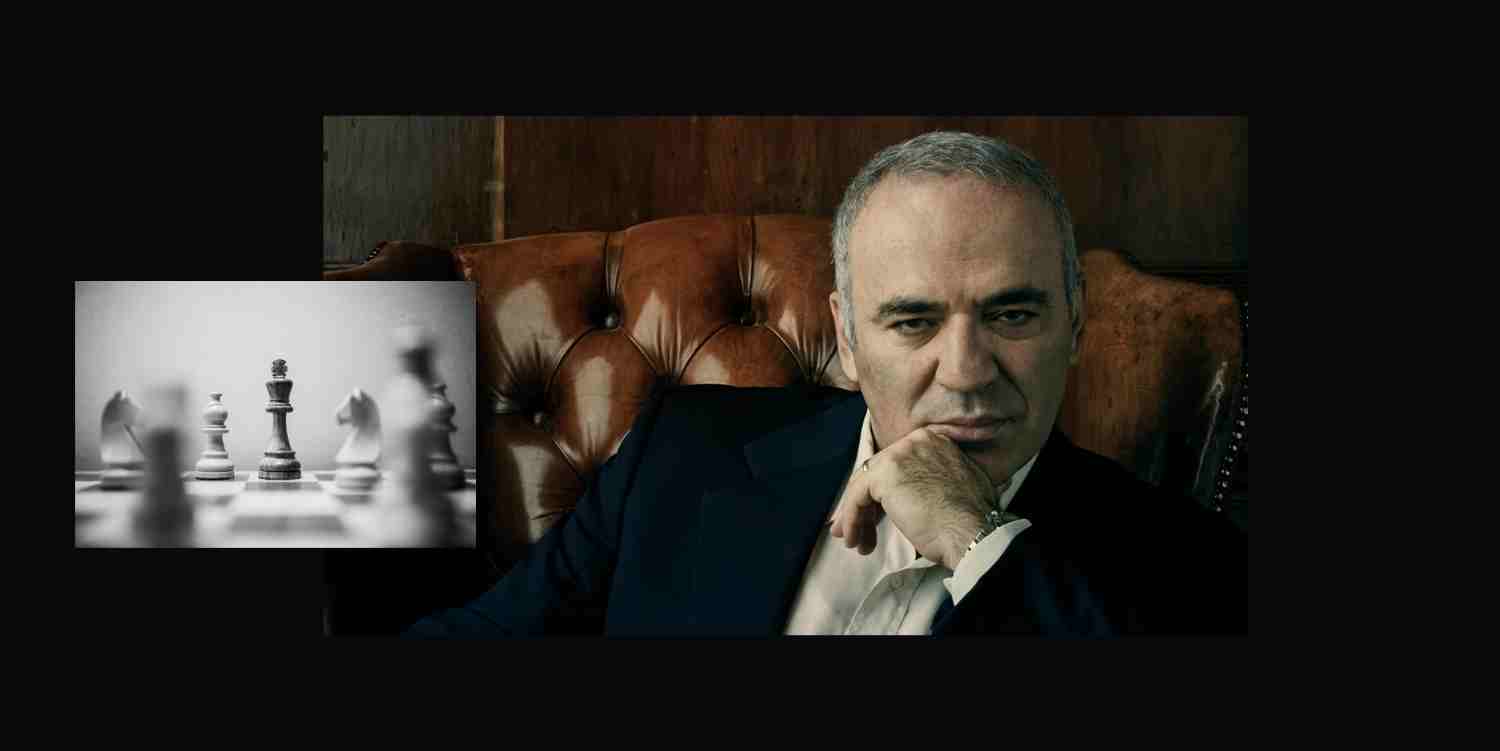Introduction
When you hear the name Garry Kasparov, you don’t just think of a chess player but a chess legend. For many years, Kasparov ruled the chess world thanks to his sharp tactics, strong aggression & unmatched strategic brilliance. From a kid in a Soviet town to the king of chess, his story is packed with big wins, wild battles & a life that goes well beyond a game.
A Kid Who Loved Chess
Garry was born on April 13, 1963, in Baku, Azerbaijan, back when it was part of the Soviet Union. His real name was Garik Weinstein; his mother, Klara, was of Armenian descent & his father, Kim Moiseyevich Weinstein, was Jewish. Sadly, Garry lost his father when he was just seven years old. After that, his mom, Klara, became his rock. She got him into chess & to honor his mother’s support & heritage, he later adopted her surname—Kasparov.

His chess journey began early. From age seven, Kasparov attended the Young Pioneer Palace in Baku & at ten, began training at Mikhail Botvinnik’s chess school under coach Vladimir Makogonov. This school shaped many chess prodigies, but even there, young Garry stood out with his exceptional talent & fierce determination.
The Secret Chess Notebook
Kasparov kept a handwritten notebook while attending Botvinnik’s chess school as a teenager, which has never been fully made public. This was a private collection of unique chess puzzles & crazy experiments with no intention of being seen by others, unlike his later published works. A friend from his Baku days once recalled Kasparov sketching a position with two kings on the board, joking it was “chess for the gods.” Another entry apparently contained a problem so complex that, during a review session, Botvinnik himself wrote a rare note of confusion in the margin. It’s never surfaced online, making it a tempting mystery.
The Lost Game That Shaped His Style
At the age of 12, Kasparov engaged in a casual game of chess with a local hustler in Baku in 1975. The man was a seasoned veteran who was simply known as “Old Sasha.” This street game ended in a rare defeat for young Garry, who misjudged Sasha’s unconventional, chaotic style, in contrast to his polished tournament matches. Kasparov spent days analyzing the game on a pocket chess set, muttering about “hidden traps,” according to a childhood friend. Unofficially unrecorded, this defeat is said to have sparked his later, recognizable aggression, transforming a humiliating experience into a lesson that will last a lifetime: outthink unpredictable opponents.
Climbing to the Top

Garry didn’t waste time. At 12, he won a big junior chess title in the Soviet Union. By the age of 15, he was easily beating adults. At 16, Kasparov played in a strong tournament in Baku, his hometown, against Soviet grandmasters. The fact that local organizers attempted to discredit him by giving him a small, noisy playing area close to a window with street distractions—possibly out of concern for his Jewish heritage & growing popularity—is rarely mentioned.
Despite his convincing victory with a score of 11.5/15, Kasparov later suggested in an unofficial Russian interview that this incident stoked his mistrust of authority, which served as an early cause for his later political career.
His big break came in 1980 when he won the World Junior Chess Championship in Germany at the age of 17, proving to the world that he was here to stay. He had a bold approach, took chances & always had a plan.
He made history at the age of 17 when he defeated one of the best players in the world, Viktor Korchnoi, in a tournament match. With this win, Kasparov made a bold statement that he was prepared to face the big names.
A Political Move in the 1984 Match : Kasparov vs. Karpov
No story about Kasparov would be complete without mentioning his legendary rivalry with Anatoly Karpov, the reigning World Chess Champion at the time. These two had one of the most intense & long-running rivalries in chess history.
In 1984, Kasparov competed for the World Chess Championship against Karpov. The match became an intense mental & physical battle. It lasted 48 games over five months—the longest title match ever—but was controversially called off by FIDE (the World Chess Federation) without a winner.
A lesser-known twist is Kasparov’s private belief—shared years later in a small chess club talk—that Soviet officials pressured FIDE president Florencio Campomanes to stop it not just for health reasons but to protect Karpov’s image as a Soviet hero. Kasparov suspected a political agenda tied to his outsider status (Armenian-Jewish roots in a Russian-dominated system), though he lacked proof.
Kasparov got his revenge in 1985, when he became the youngest World Chess Champion at the age of 22, a record he still holds today.
The Chessboard Smashing Incident
There is very little record of Kasparov’s fiery temper erupting during a heated 1986 rematch against Karpov. Garry stormed out of the playing hall after a tiresome draw in Game 14, angry at what he perceived to be Karpov’s stalling tactics, & smashed a wooden chessboard against a backstage wall, splintering it. Only one Soviet journalist’s unpublished notebook, which was later cited in a chess memoir from the 1990s, mentions the incident because organizers kept it quiet. Although Kasparov never publicly acknowledged it, the story highlights how deeply he lived the game & gives his polished champion persona a more genuine, human edge.
The Film Role That Never Was
In 1987, while taking a rare vacation from chess, Kasparov was discreetly offered a role as a chess-loving revolutionary in a Soviet propaganda movie about the Bolshevik revolution. The offer came from a lesser-known filmmaker hoping to capitalize on Garry’s fame. He declined, hesitant to be associated with a government he was increasingly opposing; he later referred to this choice in an interview with a Russian magazine in the 1990s that was never widely reported in English. This near-miss acting gig adds a fascinating “what if” to his story, hinting at a parallel path where Kasparov could’ve been a screen icon as well as a chess one.
The King of Chess
Garry held the world title from 1985 to 2000. He faced Karpov a few more times (1986, 1987, 1990) & each match was a nail-biter. No one beat his record-breaking score of 2851 in 1999, which put him at the top of the world rankings for 15 years. He won numerous major competitions, including Linares & Tilburg; he even assisted the Soviet team in winning gold at the 1990 Chess Olympiad.
His games were exciting to watch. Instead of playing it safe, Garry took risks & created moves that left people speechless. His 1999 match against Veselin Topalov is regarded as his “Immortal Game” due to its exceptional quality. Chess fans are still talking about it.
Taking on a Computer
Garry’s most famous game wasn’t even against a person—it was against a computer called Deep Blue, made by IBM. Deep Blue was an advanced chess-playing computer. In 1996, he played it & won 4-2.
But in 1997, Deep Blue shocked the world by defeating Kasparov in a six-game rematch by 3½-2½. It was a huge deal—the first time a computer defeated a reigning world champion under standard chess tournament conditions. Even though he lost, that match showed how smart Garry was—he took on the future & made history.
Achievements & Records
Kasparov’s chess career is packed with achievements:
- World Champion from 1985 to 2000 – the longest reign in chess history.
- 15 consecutive tournament victories – a record that still stands
- Rating of 2851 in 1999 – the highest ever recorded at the time.
- Author of multiple best-selling chess books – Including My Great Predecessors & How Life Imitates Chess.
Even after retiring from professional chess in 2005, Kasparov remained an influential figure in the chess world. He became a mentor & trainer, guiding young talents like Magnus Carlsen, who would later become the world champion.
Life After Chess
In 2005, Garry retired from pro chess after winning Linares one last time. He was done proving himself. But he didn’t just disappear. He wrote cool books, like How Life Imitates Chess, where he talks about chess & life lessons. He also got into politics, speaking out against Russia’s leader, Vladimir Putin, which got risky—so he moved to New York.
In 2017, he played a fast chess tournament in St. Louis just for fun, & even at 54, he was still awesome. Now, he runs the Kasparov Chess Foundation to help kids learn chess, keeping his love for the game alive.
Interesting Facts About Garry Kasparov
- He became the youngest ever World Chess Champion at 22.
- He coached Magnus Carlsen, who later became a world champion.
- He has written multiple books on chess & leadership.
- He was arrested in 2012 for protesting against Putin’s policies.
- His rating of 2851 stood as the highest-ever chess rating for over 20 years.
Why He’s a Legend
Garry Kasparov didn’t just win—he changed chess. He was the best for years, took on computers, & inspired players like Viswanathan Anand & Magnus Carlsen. His battles with Karpov & Deep Blue are stuff people still talk about. He once said chess is about willpower, & man, did he have a ton of it. From a kid in Baku to a worldwide star, Garry Kasparov made chess bigger, better & way more exciting. His story’s not over—he’s still the guy every chess player looks up to.
Even today, his legacy continues to inspire chess players, leaders, & freethinkers alike. Kasparov once said:
“We learn little from victory, but a lot from defeat.”
& indeed, whether winning or losing, Kasparov always played with passion & left a mark that will be remembered for generations.



